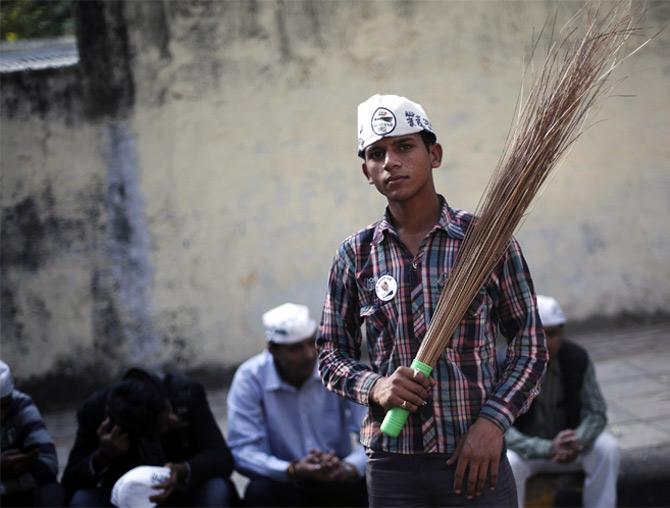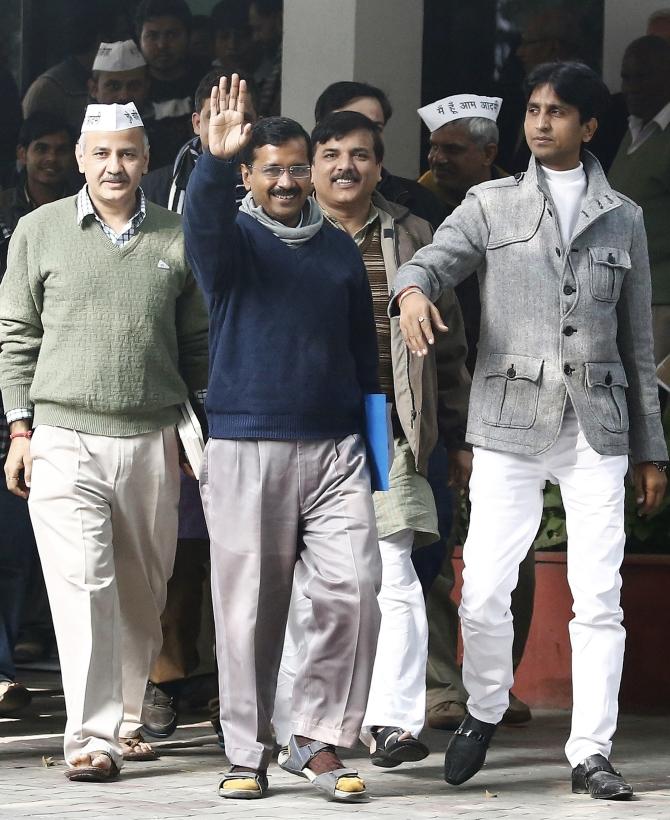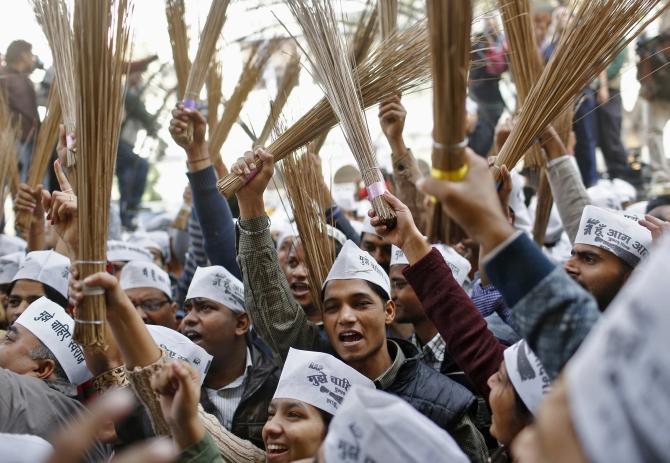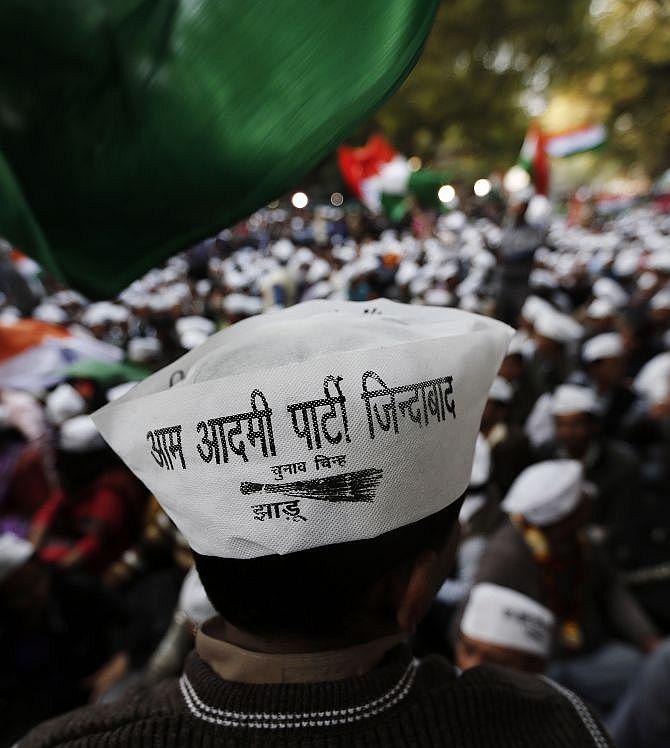
The last few weeks have witnessed a remarkable phenomenon: the rise of the Aam Aadmi Party from its inception a year ago to forming the government of Delhi last week. In these few weeks, it has kindled great hopes for clean governance in Delhi and beyond, tempered by strong misgivings about the party's economic and urban policies. What follows is an imaginary dialogue between the Optimist and the Sceptic.
Optimist: Isn't it amazing what the AAP has accomplished by winning 28 seats, forming a government and already implementing its pro-people policies on water and power? Two months ago, nobody gave it a chance against the established parties, the Congress and the BJP, with their cadres, vote banks, vested interests, and crony-capitalist funding sources.
And the AAP has done all this with a real mobilisation of people, clean finances and an unflinching commitment against corruption and in favour of the equitable delivery of urban services. It has shown that you can win elections without pandering to caste and creed. Now it is going to go national in the general elections. I tell you there is hope for India yet!
Sceptic: You are right. It's an amazing performance. Full marks to Arvind Kejriwal and his colleagues for their courage, commitment and labouring against all the odds. But don't go over the moon too soon. Winning an election is not the same as governing. Look what a blunder they have made with their 20 kilolitres/household/month free water policy. It may have helped them win votes.
But it will do substantial damage to the already weak finances of the Delhi Jal Board (DJB) and to basic principles of sustainable urban water pricing policy. It won't help (and may hurt) the 30-40 per cent of Delhi's residents (the real poor) who don't have piped water; it does nothing to solve the 40-50 per cent leakage of Delhi water supply (both real leakage in a poorly maintained system and "leakage" to tanker mafias); and it sharply increases the incentives for meter-tampering (and associated corruption) by all households consuming close to 20 kilolitres per month.
...

Optimist: Come on, you are being too harsh. Give them time and they will tackle the longer-term problems with the DJB.
Read their manifesto and listen to Mr Kejriwal's inspiring Assembly speech on YouTube. Look, by announcing their water and power subsidies right away, they ensured winning the confidence vote in the Assembly and showed they meant business with their promises. Their crusade against corruption will take time, but surely it's worth fighting - and the new lok pal Bill will help. Don't you want clean governance?
Don't you want to see an end to the obnoxious VIP culture that permeates Delhi and much of political India? Look at what terrific examples the AAP leaders are setting by forgoing large bungalows, huge security retinues, "lal battis" on cars, and traffic-blocking VIP motorcades. It's not just about symbolism; it's about curbing the addiction to special privileges, which cumulate to such a degree that "netas" feel exempt from general norms, including, often, the laws of the land. The AAP's examples are already having salutary effects on how Congress and BJP leaders are behaving.
Sceptic: I am 100 per cent with you and the AAP on exemplary steps to curb the "VIP-neta" culture. In fairness, there are quite a few Congress and BJP leaders in Delhi and the states who avoid this syndrome. And I did watch Mr Kejriwal on YouTube and sympathised with much of what he said about improving government schools and hospitals, tackling slum dwellers' problems, women's security, the justice system and so forth. But how?
For all this, you need an efficient, accountable and responsive state machinery and well-considered policies. Obviously, we are far from that. How do we design and nurture the right reforms? Giving popular freebies for water and power will not achieve the goals of efficient, equitable and accountable service delivery - unfortunately, they have encouraged emulation in Maharashtra, Hyderabad and Haryana. Nor will threatening CAG audits of the private power discoms.
Infrastructure expert Vinayak Chatterjee points out that since private discoms were created in 2002, Delhi's power "distribution losses" have come down from 57 per cent to 17 per cent and this has helped hold down tariff increases to 70 per cent over the past decade when the cost of power procurement increased by 300 per cent ("Power play in Delhi", January 6, 2014). If these numbers are right, why not privatise Delhi's water distribution, which has been done successfully in many cities of the world? Somehow, I don't think AAP leaders would be open to this.
...

Optimist: You are incorrigible! At least admit that the AAP will bring about a big improvement in the burden of corruption, extortion and bribery which weighs heavily on the majority of Delhi residents.
That, after all, is the overarching goal, which has motivated them to enter electoral politics and seek a new deal. Just see how clean they have been in financing and conducting their electoral campaign. And look at the strength of their commitment to eliminate corruption.
Sceptic: I not only admit, I greatly admire the way the AAP has conducted its election campaign. That and its deep commitment to substantially reduce, if not eliminate, corruption certainly augur well. At the same time, I doubt that this can be accomplished only through stronger laws, rules and prescribed penalties against offenders.
Much can be achieved by understanding how markets work and how they can be harnessed to serve an anti-corruption programme. This is where I have doubts about the AAP's thinking and instincts.
Taking water as an example, the AAP's policies exacerbate scarcities and then rely too much on regulation and enforcement. One other thing: not once in his eloquent 26-minute Assembly address did Kejriwal mention the paramount needs for jobs, investment and growth.
For a man in charge of India's most important city, that worries me enormously.
...

Optimist: Say what you will, I think the rise of the AAP is a very welcome phenomenon, which right-thinking people should support.
You wait till the general elections; an honest, cleanly financed, pro-people party, which rises above the identity politics of caste and creed, could end up winning quite a few seats. And then it might become a cleansing force in Indian politics to be reckoned with.
Sceptic: You may be right. In 2014, that suggests a much higher chance of a coalition national government of the third-front variety.
Feel better? I am not sure I do.
The writer is honorary professor at Icrier and former chief economic adviser to the government of India. Views are personal